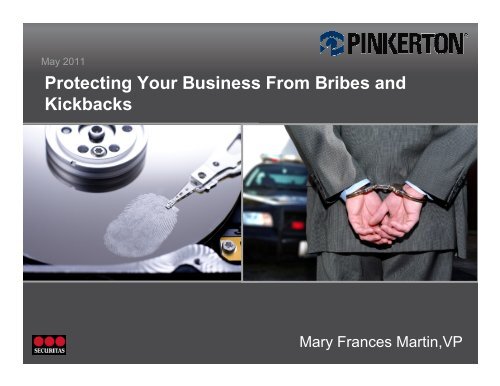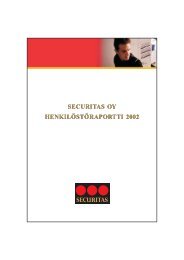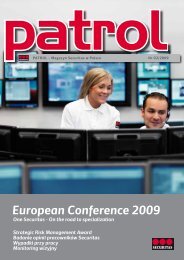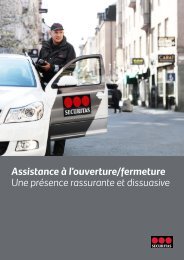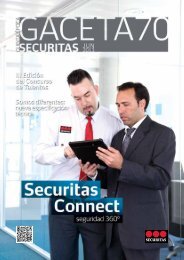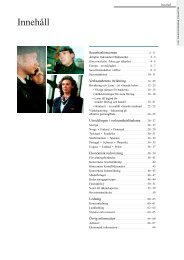Protecting Your Business From Bribes and Kickbacks - Securitas
Protecting Your Business From Bribes and Kickbacks - Securitas
Protecting Your Business From Bribes and Kickbacks - Securitas
Create successful ePaper yourself
Turn your PDF publications into a flip-book with our unique Google optimized e-Paper software.
May 2011<br />
<strong>Protecting</strong> <strong>Your</strong> <strong>Business</strong> <strong>From</strong> <strong>Bribes</strong> <strong>and</strong><br />
<strong>Kickbacks</strong><br />
Mary Frances Martin,VP
Why this seminar?<br />
More <strong>and</strong> more companies are making headlines but not in a good way…<br />
The reason is due to bribes <strong>and</strong> kickbacks that are discovered. At such a<br />
time when there is more globalization <strong>and</strong> growth the trend does not<br />
look like it is going to change<br />
<strong>Bribes</strong> <strong>and</strong> kickbacks can come from businesses trying to influence the<br />
public sector (governments <strong>and</strong> their agencies) or they can be business<br />
to business<br />
Some amounts are very small ($50 USD per transaction) that can add up to<br />
a lot if you are in fleet management or they can be very large payments<br />
(hundreds of millions)
Growing Trend<br />
Source: PricewaterhouseCoopers' Global Economic Crime Survey 2009
Headline Makers<br />
Penalties:<br />
Siemens AG $1.6b<br />
Halliburton & KBR $579m<br />
Baker Hughes $44m<br />
Novo Nordisk $18m<br />
Nature’s Sunshine $600k<br />
$25k/Officer<br />
Lucent $2.5m<br />
York International $22m<br />
Titan $30m<br />
Schering-Plough $500k
FCPA Violators<br />
CEOs, CFOs & Board Members Are Going to Jail<br />
Jack Stanley – KBR $180m in bribes to Nigeria<br />
• Sentenced 7 years & pay $10m<br />
Murphy & Williams - American Rice, Inc. Haiti taxes<br />
• Murphy 63 months & Kay 37 months<br />
Greens – Film Festival $1.8m bribes for $13.5m contracts<br />
• Possible Sentences – 5-20 yrs?<br />
W Jefferson – Nigerian Telcom business<br />
• Acquitted of FCPA – Cash in the freezer – 150 yrs?<br />
Bourke – Azerbaijan $8m investment lost<br />
• Guilty - No evidence that he actually paid the bribes – 10 yrs?<br />
Sapsizian – Alcatel $2.5m bribes to Costa Rica<br />
• Sentenced 30 months <strong>and</strong> forfeit assets<br />
Jury Foreman: “He should have known this was going on, it’s his job”
Problem with <strong>Bribes</strong> <strong>and</strong> <strong>Kickbacks</strong><br />
Part of the problem with <strong>Bribes</strong> <strong>and</strong> <strong>Kickbacks</strong> is that no one really wants to talk<br />
about it.<br />
Most corporate managers shrink when someone even jokes about it because it is not<br />
funny!<br />
It is very pervasive throughout the world but it is also not very well understood<br />
The United States law commonly known as FCPA (Foreign Corrupt Practices Act)<br />
seeks to address this issue in terms <strong>and</strong> ways that are real<br />
A lot of people may have heard “FCPA” but few know its background <strong>and</strong> effect in<br />
real terms
FCPA Background<br />
• In 1977, the US 95 th Congress enacts the Foreign Corrupt<br />
Practices Act (FCPA)<br />
• Result of SEC investigations in the mid-1970's, over 400<br />
US companies admitted making questionable or illegal<br />
payments in excess of $300 million to foreign<br />
government officials, politicians, <strong>and</strong> political parties<br />
• In 1988, the Congress directed the Executive Branch to<br />
commence negotiations in the Organization of Economic<br />
Cooperation <strong>and</strong> Development (OECD) to obtain the<br />
agreement of the United States' major trading partners to<br />
enact legislation similar to the FCPA<br />
• In 1997, the US <strong>and</strong> thirty-three other countries signed<br />
the OECD Convention on Combatting Bribery of Foreign<br />
Public Officials in International <strong>Business</strong> Transactions
FCPA Elements<br />
Statute – Title 15 U.S.C. Section 78dd-1<br />
Anti Bribery<br />
• Any issuer, domestic concern or anyone acting within<br />
the jurisdiction of the US with “corrupt intent” to directly<br />
or indirectly, offer, pay or promise to pay or authorize<br />
payment of “anything of value” to a “foreign official” for<br />
the purpose of obtaining or retaining business or<br />
securing any improper business advantage.<br />
Accounting Provisions<br />
• All transactions must be accurately <strong>and</strong> “fairly”<br />
described in the company’s books <strong>and</strong> records<br />
• Must have adequate controls<br />
Who Does it Affect? All US companies <strong>and</strong> foreign public<br />
companies reporting to the SEC that are doing business<br />
internationally!
FCPA Elements<br />
1-Who<br />
Any individual, firm, officer, director, employee or agent of a firm, <strong>and</strong><br />
any stockholder acting on behalf of a firm<br />
2-Corrupt Intent<br />
If the payment is made to influence any act or decision of a foreign<br />
official in his official capacity<br />
3-Payment<br />
Prohibits paying/making an offer or promise of anything of value<br />
4-Recipient<br />
Foreign official, foreign political party or official of such party,<br />
c<strong>and</strong>idate for political office or agent with knowledge of payment<br />
5-<strong>Business</strong> Purpose Test<br />
Prohibits payments made in order to assist the payor in<br />
obtaining/retaining business with or directing business to, any person.
FCPA<br />
Unlawful: To offer or give anything of value to a foreign<br />
official<br />
To influence an official act,<br />
• induce to do or omit to do any act in violation of lawful<br />
duty,<br />
• to secure an improper advantage, or<br />
• to use influence with the government to affect or influence<br />
any act or decision of the government<br />
• to obtain, retain or direct business to any person
FCPA Elements<br />
Accounting Provisions:<br />
• Required to “make or keep books, records, <strong>and</strong> accounts<br />
which, in reasonable detail, accurately <strong>and</strong> fairly reflect<br />
the transactions <strong>and</strong> dispositions of the assets of the<br />
issuer.”<br />
• Required to “devise <strong>and</strong> maintain a system of internal<br />
accounting controls sufficient to provide reasonable<br />
assurances that management knows what is going on in<br />
the company.”
FCPA Enforcement Agencies<br />
Regulatory Bodies:<br />
Department of Justice (DOJ) & Securities Exchange<br />
Commission (SEC)<br />
• Dedicated to prosecuting companies <strong>and</strong> their officers - “Expansive<br />
Enforcement”<br />
• Reputation at stake <strong>and</strong> must bring them to trial<br />
• Current Administration will encourage more investigations<br />
• Governments working together (MLATs)<br />
• Task Forces/Special Units<br />
Actions:<br />
• 2002 - 7 cases initiated<br />
• 2007 - 38 cases initiated<br />
• 2010 – 120 open investigations
FCPA Triggers<br />
What triggers an investigation?<br />
• Whistle-Blower<br />
• Risk Based Investigations<br />
• "Wildcatting" for Fraud<br />
• Industry Wide Investigations<br />
• Insider Trading<br />
• Affiliation with Executives, Shareholders, or Corporations<br />
under Investigation<br />
• Complaints/Tips<br />
• Referrals from civil agencies<br />
• Civil suits<br />
• Press (e.g., WSJ)<br />
• Self reporting
Legal or Illegal?<br />
It is difficult to have one st<strong>and</strong>ard that works in every part of the world <strong>and</strong> under<br />
every circumstance<br />
The question of legality usually revolves around influence <strong>and</strong> knowledge<br />
While we are not attorneys, the common thread of legal transactions seems to be:<br />
Influence is fair <strong>and</strong> balanced – that is, no one is unduly influenced by any<br />
involved parties<br />
Knowledge of the transaction is known to all vested parties<br />
Transactions such as commissions, fees, refunds that are:<br />
• statutorily legal<br />
• no undue influence of anyone to do (or not do) an act<br />
• visible to all parties are usually legal
<strong>Bribes</strong> <strong>and</strong> <strong>Kickbacks</strong><br />
<strong>Bribes</strong> are defined by Black’s Law Dictionary as:<br />
The offering, giving, receiving, or soliciting of any item of value to<br />
influence any actions of an official or other person in charge of a public<br />
or legal duty<br />
One definition of <strong>Kickbacks</strong> is:<br />
An illegal, secret payment made in return for a transaction or contract<br />
being consumated (finalized)<br />
NOTE: Throughout the next slides we will show some case work that the<br />
Pinkertons have done in Asia on <strong>Business</strong> to <strong>Business</strong> <strong>Bribes</strong> <strong>and</strong><br />
<strong>Kickbacks</strong>
Case History #1 - Bribery<br />
Problem:<br />
ABC Company in China found their sales of products (computer chips) had dropped tremendously. The<br />
Marketing Manager conducted a discreet enquiry with their customers <strong>and</strong> found that a Firm X was selling the<br />
products much cheaper than them<br />
They managed to buy the chips from their customer <strong>and</strong> traced back their chips were from their Penang<br />
(Malaysia) Plant. ABCCompany carried some investigation <strong>and</strong> found there was a high ratio of ‘failed’ chips by<br />
their QC engineer (target)<br />
The ‘failed’ chips were supposed to be sent to an outsourced company, waste recycling company to be melted<br />
down or destroyed<br />
Pinkerton Action:<br />
A variety of investigative methods was used in gathering evidence. Computer forensic was also done on target’s<br />
laptop. Surveillance conducted on the QC engineer to see who he was meeting <strong>and</strong> where he frequented<br />
Results:<br />
Investigation conducted found target had deposits of large amounts of monies. Operatives saw him meeting with<br />
the boss of the waste recycle company<br />
An interview was conducted with the target, who finally admitted he took money to make false QC failure on the<br />
chips
Areas of Concern<br />
While there is no aspect of a company that is immune from <strong>Bribes</strong> <strong>and</strong><br />
<strong>Kickbacks</strong> there are areas that tend to suffer most from these forms of<br />
malfeasance:<br />
• Procurement or Sourcing Departments<br />
• Sales or Marketing Departments<br />
• Fleet Management (cars, equipment, supplies)<br />
• Inventory Management (company assets)<br />
• Production facilities<br />
• Accounting or Finance Departments
Case History #2 - Kickback<br />
Problem:<br />
• Pharmaceutical client experienced a suspicious increase of the sales of one of its products which it believed<br />
to be the result of a bonus manipulation scheme by some of its sales teams<br />
• The individuals suspected of running the scheme were 3 Area Managers with initials Mr. A, Mr. B <strong>and</strong> Mrs. C<br />
• Evidence which may prove the scheme were believed to be located within the office computer files <strong>and</strong><br />
correspondence emails of/used by the suspects<br />
• Pinkerton was enlisted to prove the above allegation <strong>and</strong> determine the method carried out by the suspects<br />
Pinkerton Action:<br />
• Pinkerton used Computer Forensics on laptops of area managers <strong>and</strong> their sales support team provided by<br />
the client<br />
• Field inquiries were conducted of the pharmacy distributors to find any relationship between area managers<br />
<strong>and</strong> their sales support team<br />
• Financial inquiries <strong>and</strong> general investigation was also carried out on the leads found from the Computer<br />
Forensics work<br />
Results:<br />
• Forensics revealed no sign of alleged misconduct by the sales teams<br />
• General investigations revealed that some of the contact persons of the pharmacy distributors exercise<br />
unusual caution in communication<br />
• Further investigation confirmed a flow of suspicious funds from members of the sales teams to staffs of<br />
pharmacy stores <strong>and</strong> distributors
Sample of Methods of Payment<br />
Facilitating or “Grease” Payments<br />
Use of Agents <strong>and</strong>/or Representatives<br />
Shipping Agents<br />
Promotional Activities<br />
Gifts <strong>and</strong> Entertainment Events (Junkets)<br />
Travel Expenses<br />
Sales <strong>and</strong> Marketing Expenses<br />
Taxes<br />
Employment of Directed Parties
Case History #3 – Theft <strong>and</strong> Bribery<br />
Problem:<br />
• ABC Company, a logistic company found out that there were big shortages of their high values good, during<br />
their inventory stock audit. An internal investigation was carried out but found nothing<br />
Pinkerton Action:<br />
• A variety of investigative methods were empoyed that gathered useful evidence including: surveillance, financial<br />
checking, undercover operations <strong>and</strong> interviews<br />
Results:<br />
• During undercover operations, Pinkerton operative found out that the ABC Company’s supervisor (Mr X) was<br />
very close with the security officers on duty, always buying food <strong>and</strong> drinks for them.<br />
• Mr x <strong>and</strong> the security team would go for drinking session after work. The Mr. X would pay for everything. During<br />
one drinking session, Mr. X passed an envelope to the security team’s head<br />
• During the collection, operative observed that the security officer did not conduct the check on the collection<br />
<strong>and</strong> signed off<br />
• Surveillance on the collection process revealed that the trunk went to another warehouse instead of the<br />
designated client’s plant <strong>and</strong> goods were offloaded. Mr X was found at the said warehouse<br />
• An interview was conducted with the security supervisor <strong>and</strong> officers, who finally admitted they had accepted<br />
bribe from the Mr X (ABC Company supervisor) not to check on the collection <strong>and</strong> sign off<br />
• With the evidence gathered, Mr. X admitted that he <strong>and</strong> his team had committed systematic thefts
Safety Check<br />
When Building Relationships with:<br />
• Vendors<br />
• Clients<br />
• Channel Partners<br />
• Joint Ventures<br />
• Mergers & Acquisitions<br />
• Intermediaries<br />
• Consultants<br />
• Employees
Safety Check<br />
Do you know who you are conducting business with?<br />
• Thoroughly Vetted?<br />
• Reputation in the market?<br />
• Ethical St<strong>and</strong>ards?<br />
• Legal Background <strong>and</strong> History?<br />
• Financial History?<br />
• Credit St<strong>and</strong>ing?<br />
• Trustworthy?<br />
• Associates or affiliates of the entity?
Case History #4 – Alleged Kickback<br />
Problem:<br />
• A vendor of a major parts firm (Client) contacted the firm’s HQ <strong>and</strong> reported that the firm’s procurement staff<br />
member asked the vendor for a 2% kickback for all purchases made by his firm<br />
• The Asia Legal Counsel delegated by Client asked Pinkerton to verify <strong>and</strong> investigate the alleged kickback<br />
scheme as reported by the vendor<br />
Pinkerton Action:<br />
Pinkerton conducted discreet inquires in two phases:<br />
Phase I – Verification of the kickback allegations<br />
• To interview the principals of the vendor that initiated the complaint in order to gain a complete underst<strong>and</strong>ing of<br />
the alleged kickback solicited by Client’s employee, as well as to determine if any additional Client’s employees<br />
/vendors were implicated<br />
Phase II – Interview with Client’s vendors<br />
• To conduct investigation type interviews with other vendors to determine the extent of the alleged kickback, as<br />
well as to gain information <strong>and</strong>/or evidence regarding the kickback scheme<br />
Results:<br />
• Based on the information provided by the principals of the vendor, the allegation regarding Client’s suspect’s<br />
request for a 2% kickback was confirmed.<br />
• A total of 24 vendors were interviewed: 17 in Taiwan <strong>and</strong> 7 in China. The Client’s suspect was responsible for 10<br />
of the interviewed vendors; however, no irregularities or abnormal activities were noted in the suspect’s<br />
business interactions with the vendors.
Case History #4 - Continued<br />
• A vendor from Taiwan revealed that about three (3) years ago, Client dispatched their quality assurance (QA)<br />
teams to ten (10) selected factories in China. The QA personnel would occasionally claim to find problems<br />
with the products produced by the vendor thus the vendor would have to give gifts. Although the QA teams<br />
rotated to different factories after a period of one (1) year, the new team would follow the practices of the<br />
former team<br />
• Another vendor from Taiwan revealed that in the past Client’s QA teams had the power to permit or cease<br />
production in the factory. As a result, some QA staff requested “female escorts” after dinner before signing<br />
the QA product approval form<br />
• Another vendor from China revealed that a female QA employee from Client’s China branch office requested a<br />
3% kickback from another one of Client’s China vendors; however, the said vendor ignored the request<br />
• Based on the given testimonies from other vendors h<strong>and</strong>led by Client’s other staff members, abnormal<br />
activities <strong>and</strong> irregularities still occur between Client’s staff with its vendors<br />
• Pinkerton’s involvement ended after the interviews
Reality Check<br />
Pinkertons realize that corruption is very hard to<br />
detect much less stop however there are some<br />
things that companies (entities) can do to<br />
severely limit their occurrence within your<br />
organization<br />
One form is Preventive <strong>and</strong> the other is Interdictive<br />
The best is to Prevent (of course) but there are also<br />
ways to stop it upon detection
Preventive – Six Ways to Protect<br />
1. Make a bold policy statement that you will NOT TOLERATE<br />
corruption of any kind (bribery, fraud, kickbacks, etc)<br />
2. Create team from business units, functional groups to work<br />
together to address all allegations of corruption under<br />
Compliance Department – see next slide<br />
3. Install a hotline or reporting service that will be a conduit for<br />
anonymous information<br />
4. Training program – teach people what to look for<br />
5. Financial <strong>and</strong> Administrative Audits (DOJ recommends external<br />
every five years)<br />
6. Periodic review/audit of all contracts <strong>and</strong> partners (vendors,<br />
channel <strong>and</strong> JV partners, clients)
Preventive - Implementation<br />
Compliance Department<br />
• Above CEO reporting<br />
Directly to Board<br />
• Dictate Policy of Anti-<br />
Corruption to Company<br />
• Controls/Approves All<br />
Transactions<br />
• Training for Employees<br />
• Not Just a Paper Program<br />
• Know <strong>Your</strong> <strong>Business</strong><br />
Partners<br />
Compliance<br />
Board<br />
CEO Legal CFO
Preventive – Due Diligence<br />
Things you can find out about entities through Pinkerton:<br />
• Name(s) – DBA’s (doing business as)<br />
• Contact information (phones,websites, addresses)<br />
• Type of business registration (industry, company)<br />
• Type of business (partnership, JV, sole owner, corp.)<br />
• Ownership interests<br />
• Upper management composition<br />
• Locations<br />
• Divisions/Departments/Subsidiaries<br />
• Financial data: Revenue, costs, profit/loss, etc<br />
• Credit st<strong>and</strong>ing<br />
• Company affiiations<br />
• Media searches<br />
• Database searches<br />
• Civil Litigations<br />
• Public company information – access to annual reports<br />
• Reference checking<br />
• Relationship checking – surveillance<br />
• Reputation in the market
Preventive - Background Investigation<br />
Things you can find out about individuals through Pinkerton:<br />
• Criminal<br />
• Civil Litigation<br />
• Credit st<strong>and</strong>ing<br />
• Media Searches<br />
• Database searches<br />
• Employment History<br />
• Education History<br />
• Professional Credentials<br />
• Reference Checking<br />
• Relationship Checking (surveillance)<br />
• Reputation in the market or industry<br />
• Affiliations or associations with individuals <strong>and</strong>/or firms<br />
• Ownership positions in firms
Interdictive – Stopping Corruption<br />
Follow up on allegations (especially ones that seem very credible or have<br />
multiple citings from various sources)<br />
Best to coordinate efforts of investigation with third party source<br />
(impartial) that are professionals in investigating such matters<br />
Various ways of information gathering through Pinkerton:<br />
Surveillance Market Surveys<br />
Interviews Forensic Accounting<br />
Investigative Cover Database research<br />
Undercover work Media Searches<br />
Computer Forensics Relationship Mapping <strong>and</strong> Analysis<br />
Electronic Discovery “Sting” operations
Downside of Corruption<br />
FCPA-Penalties<br />
• <strong>Business</strong>es – Maximum fine of $2,000,000 per violation or twice the<br />
gross loss or gain<br />
• Individuals – Maximum fine of $250,000 or twice the gross loss or<br />
gross gain <strong>and</strong>/or imprisonment of not more than five years<br />
Other “realities”:<br />
• Loss of reputation<br />
• Prohibited from future participation in government or business bid<br />
tenders<br />
• Punitive legal fines – massive payments of damages in criminal or<br />
civil suits that could amount to hundreds of millions (USD)<br />
• Cost of compliance
Level Set<br />
You cannot get rid of Bribery, <strong>Kickbacks</strong>, <strong>and</strong> other forms of corruption<br />
however…..<br />
• You can severely reduce the likelihood by starting a program TODAY in<br />
which you take control of the situation<br />
• You can work with legal counsel <strong>and</strong> outside firms (such as Pinkerton)<br />
to implement a program of prevention <strong>and</strong>/or interdiction<br />
• You can begin to raise the threshold of pain for would-be bribery or<br />
kickback givers <strong>and</strong> takers that it is NOT WORTH IT!!<br />
• You can make your company’s culture one of integrity <strong>and</strong><br />
wholesomeness by taking ACTIVE MEASURES to stop corruption<br />
before it happens
Remember<br />
The act of sticking your head in the s<strong>and</strong> (Ostrich Syndrome) of statements<br />
like “It cannot happen to my company or department” is what we<br />
Pinkertons hear all the time… when we are called in to stop corruption.<br />
Our experience is always that it is so much more painful <strong>and</strong> expensive to<br />
stop detected corruption than to prevent it!
END<br />
QUESTIONS?
We Never Sleep<br />
www.ci-pinkerton.com<br />
Name Surname | Title of presentation | Date 36


